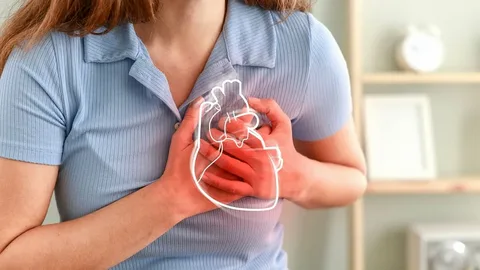Am I Having a Heart Attack? Female Quiz + Symptoms, Risks, and When to Get Help
Am i having a heart attack female quiz Heart disease is the leading cause of death among women, claiming more lives than all forms of cancer combined. In this professional blog, we’ll explore a self-assessment quiz tailored to women, highlight the unique signs of heart attacks in females, discuss common risk factors, and offer guidance on when to seek emergency help.

Understanding Heart Attacks in Women
Am i having a heart attack female quiz ?A heart attack (myocardial infarction) occurs when blood flow to the heart muscle is blocked, typically by a clot in one of the coronary arteries. Without adequate oxygen, the heart tissue begins to die — making immediate medical intervention essential.
In women, heart attacks are often misinterpreted as stress, flu, indigestion, or anxiety because the symptoms can be more subtle or atypical than those commonly associated with men.
Am I Having a Heart Attack? Female Quiz
This quick self-check quiz helps identify warning signs of a potential heart attack. It is not a diagnostic tool, but it can be a helpful step in recognizing the need for urgent care.
Instructions: Answer “Yes” or “No” to each of the following:
- Are you experiencing unusual chest discomfort, such as pressure, tightness, squeezing, or burning?
- Do you feel shortness of breath, especially at rest or with minimal exertion?
- Have you recently felt nausea, vomiting, or indigestion without a clear cause?
- Are you experiencing pain in your neck, jaw, shoulders, arms, or upper back?
- Have you felt extreme fatigue or sudden exhaustion without physical exertion?
- Are you breaking out in a cold sweat for no obvious reason?
- Have you felt lightheaded, dizzy, or faint?
- Are you having anxiety, a sense of dread, or restlessness with other symptoms?
If you answered “Yes” to two or more, especially if chest discomfort or shortness of breath is involved, you should seek emergency medical help immediately.
Common Heart Attack Symptoms in Women
Unlike men, who often report crushing chest pain, women may experience heart attacks without chest pain at all. Here’s a closer look at what women should watch for:
Chest Discomfort
- Can feel like pressure, burning, fullness, or tightness
- May not be the most prominent symptom
Shortness of Breath
- Often occurs before or without chest pain
- May happen at rest or during minimal activity
Upper Body Pain
- Pain may radiate to the jaw, neck, shoulders, back, or arms
- Often described as aching or tightness, not sharp
Nausea or Indigestion
- May be confused with gastrointestinal upset
- Especially dangerous when combined with fatigue or shortness of breath
Unusual Fatigue
- Sudden and profound tiredness
- May occur days or weeks before the heart attack
Cold Sweats or Dizziness
- Symptoms that mimic panic attacks
- Often misattributed to emotional stress
Why Are Women’s Symptoms Different?
Research suggests that hormonal differences, smaller coronary arteries, and the tendency for microvascular disease may influence the way women experience cardiac events. Additionally, psychosocial stress and depression, more prevalent in women, may affect how symptoms are perceived and reported.
Risk Factors for Heart Attacks in Women
Women share many of the same risk factors for heart attacks as men, but some risks are unique or more pronounced in females.
Shared Risk Factors:
- High blood pressure
- High cholesterol
- Smoking
- Diabetes
- Obesity
- Lack of physical activity
- Family history of heart disease
Women-Specific Risk Factors:
- Polycystic ovary syndrome (PCOS)
- Menopause (estrogen decline increases risk)
- Pregnancy-related complications (preeclampsia, gestational diabetes)
- Autoimmune diseases (e.g., lupus, rheumatoid arthritis)
- Depression and chronic stress
When to Seek Emergency Help
Never ignore or delay seeking care when experiencing suspicious symptoms. If you or someone around you is having signs of a heart attack:
Call 911 or emergency services if:
- Chest pain lasts more than 5 minutes
- Breathing becomes labored
- You feel faint or disoriented
- Symptoms are rapidly worsening
What Happens at the ER:
- ECG (Electrocardiogram) to detect heart rhythm abnormalities
- Blood tests (e.g., troponin levels)
- Imaging studies
- Prompt intervention such as angioplasty, stenting, or medications
Prevention Strategies for Women
Preventing a heart attack means making heart-healthy lifestyle choices and managing any existing medical conditions.
Healthy Habits:
- Eat a Mediterranean-style diet: rich in vegetables, whole grains, fish, and healthy fats
- Exercise regularly: aim for at least 150 minutes of moderate activity per week
- Quit smoking
- Maintain a healthy weight
- Limit alcohol intake
- Manage stress: meditation, yoga, therapy, and relaxation techniques
Medical Management:
- Regularly monitor blood pressure and cholesterol
- Take prescribed medications as directed
- Get routine heart health check-ups, especially if you have family history
Real Case Example
Sarah, age 52, had been experiencing unexplained fatigue, shortness of breath while walking up stairs, and occasional nausea. She attributed it to menopause and stress. One morning, she felt pressure in her upper chest and called her sister, who insisted she go to the hospital. An ECG confirmed she was having a heart attack. Sarah underwent stenting and survived — because she didn’t ignore her symptoms.
Statistics Every Woman Should Know
- 1 in 5 women in the U.S. dies from heart disease
- Women are more likely than men to experience silent heart attacks
- Symptoms in women are 50% more likely to be misdiagnosed
These numbers underscore the importance of education, awareness, and self-advocacy.
Final Thoughts: Know the Signs, Save a Life
Am i having a heart attack female quiz The question “Am I having a heart attack?” should never be taken lightly — especially for women, whose symptoms are often less obvious. Being aware of the subtle signs and acting quickly can literally be the difference between life and death.
If you suspect something is wrong, don’t wait. Listen to your body. Trust your instincts. And seek help immediately.
Quick Recap: What Women Should Watch For
| Symptom | Description |
|---|---|
| Chest pain | Mild or moderate pressure, tightness |
| Fatigue | Sudden, unusual tiredness |
| Shortness of breath | With or without exertion |
| Nausea/indigestion | Often overlooked |
| Back/jaw/neck pain | Common but ignored |
| Cold sweats or dizziness | Sudden and unexplained |
Would you like this post converted into:
- A Pinterest infographic with tags?
- A Facebook caption or story format?
- A printable quiz/checklist?


Leave a Reply
Want to join the discussion?Feel free to contribute!